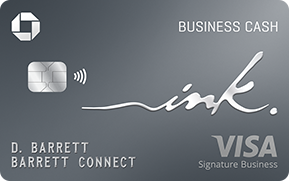Advertiser Disclosure: Some of the card links and products that appear on this website are from companies which AskSebby may receive compensation when you click on links to those products. You don't have to use our links, but we're grateful when you do! View our Advertising Policy .The content on this page is accurate as of the posting date; however, some of our partner offers may have expired.
If you own a business, you know how important it is to have access to credit when needed. A business credit card can be a great way to manage your company's finances and build your credit score over time. But getting one isn't as easy as applying for a personal credit card.
Here's what you need to know about getting a business credit card, how you can apply, and what issuers are looking for.
Disclaimer: I'm not an accountant or financial advisor. Consult a professional if you have questions related to your specific business entity.
What Counts as a Business?
Generally, any activity that offers goods or services to customers generates income from its operations and runs to make a profit is defined as a business. Businesses are all around us – from the corner store in your neighborhood to online marketplaces selling unique products worldwide.
Though many people have preconceived notions about what constitutes a business, almost anything can qualify as long as it meets these simple criteria:
- Create goods or services.
- Charge for them in some way (whether through sales or subscriptions).
- Make an effort to turn a profit by producing more revenue than expenses.
Do You Really Need a Business Card?
The answer is no. The reason for this is that issuers use your personal credit report and your personal credit score to make a decision. Business credit can be helpful if you're doing giant lines of credit.
Eligible Business Entities
Let's start by figuring out what kind of business you are in. You can find companies of all sizes and shapes, but here are some eligible ones.
- C-Corps: Owned by shareholders. The business structure is taxed separately from the owner(s).
- S-Corps: Under the tax code, S-corporations can pass their taxable income, credits, deductions, and losses directly to their shareholders.
- LLC (Limited Liability Company): LLCs are U.S. legal entities that own, operate, and protect businesses.
- Partnership: Partnerships are businesses where two or more people own and manage the company and share the profits and losses.
- Sole Proprietorship: A sole proprietorship is a business with just one owner who pays personal income taxes on the business's profits. Most sole proprietors do business under their own names because having a separate business name or trade name is not necessary.
- Gig Economy: Gig economies are labor markets where independent contractors and freelancers fill temporary and part-time jobs rather than full-time permanent workers.
Note that all of these are eligible for business cards from most U.S. issuers. Some are only for C-corps or larger ones, but for the most part, the main ones are for everyone.
What You Need to Apply for a Business Credit Card
This is what most major credit issuers are looking for when getting a business card:
- Business name: Your company's name. Your first name and last name should be entered if you are a freelancer or sole proprietor.
- Industry type and company structure: What industry your business is in, whether it's a corporation, partnership, sole proprietorship, etc. Almost everyone can get a business card as a sole prop.
- Your Business Income: Ideally, $5,000 to $10,000+ in projected income. For freelancers, your total income can be your business income.
- Tax identification number: It's either your social security number (SSN) or employer identification number (EIN), or both.
- Years in business: How long you've been in business. Ideally, it should be two or three years.
- Has a Good Credit History: No defaults, missed payments, or unusual information on your personal credit report.
Recommended Business Cards
Generally, I recommend Chase cards because there are a lot of no-annual-fee options and they've got pretty good bonuses. Easy examples of this will be the Ink Business Cash® Credit Card and Ink Business Unlimited® Credit Card. There are tons of other good cards as well outside of Chase, but if you are someone at 4/24, you generally can get Ink Cards, and it doesn't affect 5/24.
61f612995f263387c3b4b412
61f61234c58f1e3bf71eb315
Overall Thoughts
Getting a business credit card is important in managing your company's finances and building its financial health over time. Remember to do your research before choosing the best option for your needs—but when used responsibly, having access to extra funds can make all the difference between success and failure in today's competitive marketplace.
 Advertiser Disclosure
Advertiser DisclosureSome of the card links and other products that appear on this website are from companies which AskSebby will earn an affiliate commission or referral bonus. AskSebby is part of an affiliate sales network and receives compensation for sending traffic to partner sites, such as CreditCards.com. This compensation may impact how and where products appear on this site (including, for example, the order in which they appear). This site does not include all credit card companies or all available credit card offers.
Editorial Note:
Opinions expressed here are the author's alone, not those of any bank, credit card issuer, airlines or hotel chain, vendors or companies, and have not been reviewed, approved, or otherwise endorsed by any of these entities.











